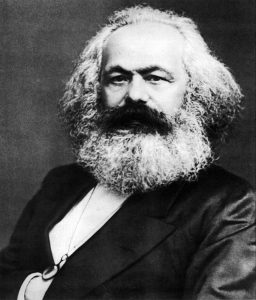Chapter Three – Communism, Karl Marx
Notes on Karl Marx
Karl Marx: Prussian Philosopher, Organizer, Economist Sociologist, etc. 1818-1883

Early Life
- Born to a wealthy middle-class family
- Of Jewish origin, his father converted to Lutheranism to escape persecution
- Marx studied as a lawyer and philosopher at the University of Bonn and the University of Berlin
- While employed at a newspaper, he began to work on a non-idealist theory of history (later this becomes historical materialism)
Adult Life
- Moved to Paris in early 1840 and met Friedrich Engels
- In 1849, following the defeat of revolutions across Europe, he was forced into exile because his political ideas were not well received by authorities.
- His theory is strongly influenced by the Paris Commune of 1871, Proudhon, Fourier, as well as by Hegel, Ricardo, and Adam Smith
- Ended his days in brutal poverty in London, UK
- He was not able to successfully establish a strong workers party, but his ideas influenced labor and workers movements and continue to do so
Dialectic Materialism
- State of Nature: freedom and poverty (thesis)
- Liberal Civil Society: wealth and lack of freedom (antithesis)
- Communist Society: freedom and wealth (synthesis)
Legacy
- Political
- Economic
- Philosophical
- Artistic
- Marx’s thinking is at the base of all modern and postmodern theory
The Communist Manifesto
Marx writes the text when the Communist League commissions him to.
- He bases his text on a manuscript by Engels
- Second most published manuscript in the Western World
- A call to arms
- The claim that socialism is inevitable is more political than “scientific”
Media Attributions
- Karl Marx © John Jabez Edwin Mayal is licensed under a Public Domain license

